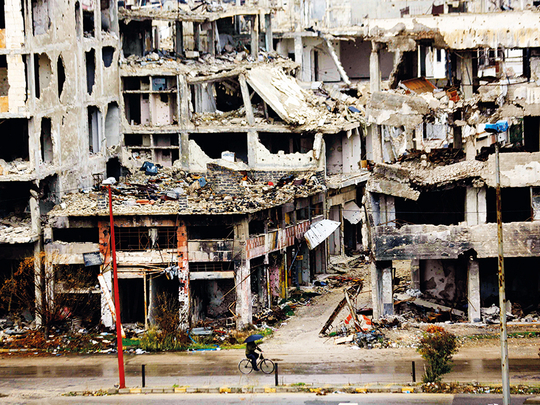
United Nations: UN Secretary-General Antonio Guterres will send his Syria peace negotiator to a conference in Russia next week, a spokesman said Saturday, despite the Syrian opposition’s boycott of the meeting.
Guterres “is confident that the congress in Sochi will be an important contribution” to reviving the peace talks held under UN auspices in Geneva, a UN spokesman said in a statement.
In Vienna, the Syrian Negotiations Commission (SNC) announced it would not be attending the Sochi conference.
Syria areas of control
Authorities in Syria’s Kurdish autonomous region said Sunday they would not participate in the Sochi talks because of the Turkish offensive on the Kurdish enclave of Afrin.
“We said before that if the situation remained the same in Afrin we could not attend Sochi,” regional official Fawza Al Yousuf said.
The RIA news agency reported on Saturday that the conference will call for the Syrian people to decide their future by “popular vote without external pressure”.
RIA news agency cited a draft communique of the congress, saying it would call for Syria to remain a united country and for a vote on the future of the country.
Russia had long sought UN participation in the conference opening on Monday in the Black Sea resort of Sochi to lend credibility to its diplomatic efforts to end the six-year war.
Hours earlier, UN envoy Staffan de Mistura ended a ninth round of UN-sponsored talks in Vienna, with no sign of progress toward a peace deal.
“I share the immense frustration of millions of Syrians inside and outside the country at the lack of a political settlement to date,” De Mistura said.
UN spokesman Stephane Dujarric indicated that Guterres had received assurances that the Sochi conference would not seek to sideline the UN talks.
Guterres was briefed by De Mistura on the outcome of the Vienna talks, and has taken into account a statement from Russia that the result of the Sochi conference “would be brought to Geneva as a contribution to the intra-Syrian talks process under the auspices of the United Nations”, the spokesman said in a statement.
The UN chief has “decided to accept the invitation of the Russian Federation to send a representative to attend the Sochi Congress” and has asked De Mistura to go, he added.
The main opposition coalition fears that Russia will push a peace deal that will keep Bashar Al Assad’s authority intact after six years of bloodshed.
The Russian foreign ministry welcomed Guterres’ decision, and said the Vienna talks had “focused in particular on the problems of constitutional reform” — a process that could determine whether or how Al Assad remains in power.
“On these issues, a mutual agreement was reached between the Russian side and the UN representatives, on the sidelines of the Vienna meeting,” said a foreign ministry statement issued in Moscow.
On the ground, Syrian forces have pressed on with an offensive in rebel-held Idlib launched in late December, with Russian backing.
Al Assad’s forces were on the defensive in the first few years of the war, but since Russia militarily intervened in 2015 they have regained the upper hand.
The US, Saudi Arabia, Jordan, Britain and France have put forward a proposal that would involve strengthening the role of Syria’s prime minister — at the expense of Al Assad’s authority, according to a leaked document circulated online.
Syrian regime negotiator Bashar Al Jaafari told reporters in Vienna it was “tantamount to a black comedy” that these countries were seeking to shape Syria’s political future.
Two weeks ago, Turkey launched air strikes and shelling against Kurdish militias in northern Syria, marking a dangerous new escalation in the conflict.
That development has raised tensions between Turkey, which along with Iran backs the Russian conference in Sochi, and the US, which has supported the Kurdish militias in the campaign against Daesh.
More than 400,000 people have died in the war, millions have fled their homes and the fighting has left the country in ruins.











